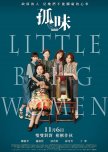
For me there were too many characters and too many conflicts to fully connect with many of the characters. I enjoyed it but I didn't love it and likely would not visit this group of dysfunctional people again. Bittersweet and heart-warming at the same time, Big Little Women at least gave us a largely female cast and shined a light on the complicated female relationships and strengths within a family.
Vond je deze recentie nuttig?
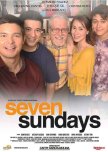
Deze recentie kan spoilers bevatten
This is my first Filipino movie and I really enjoyed it. It's the story of a family that drifted apart after the mother died years ago.The story begins with the father of four grown children spending his birthday alone because his children are too focused on their own lives and problems to visit. On the day of his unattended party his receives news that he has cancer and only 7 weeks to live. He sends a text to his children to inform them of the news.
The eldest son took over the family store and is on the verge of bankruptcy. The second son became wealthy and successful but believes his family only likes him for his money. The daughter has three children with a philandering husband. The youngest child felt abandoned after the mother died and his siblings moved away and is now in legal trouble.
The children decide to come together on a Sunday and throw him a surprise birthday party, but old wounds flare up and arguments explode. After learning of their father's distress over their squabbles, the children agree to get along for his sake and to meet every Sunday at his house. Each Sunday the family comes together on various adventures and learn about each other in the process.
There are ups and downs in the story as wounds and secrets are revealed and healed.
I don't want to spoil the secrets, but I will say that this is not a downer or tragedy. This movie is the definition of heart-warming.
I can recommend this movie with a happy heart.
Vond je deze recentie nuttig?

Deze recentie kan spoilers bevatten
I just finished this emotional T-drama about two young people shaped by tragedy and whether it was possible for them to overcome their tragic pasts. Story:
In this story two kids faced whatever life threw at them and most of the time it was boulders-mental illness, sexual assault, physical assault, PTSD, suicide, parental neglect, and evil outside forces. Somehow these two broken people found in each other the love and support they needed.
Both the ML and FL had to face their own individual traumas by peeling back the layers of lies and pain to heal and grow. And they had to do this while dealing with ongoing stressors and danger.
They fought for the right to walk hand-in-hand through the healing to the fulfillment of their dreams and no one was going to make it easy on them. Danger and disaster waited around every corner. Internal and external conflicts filled nearly the entire 21 episodes with little breathing room. It was a hard drama to let go of for something like sleep. It wasn’t a perfect story but it was compelling.
If you are triggered by any of the traumas listed above I would recommend not watching MARS. I don’t know that I would label this a dark drama but it does deal with very dark issues.
Acting:
I almost didn’t watch MARS because of Vic Chou. I’d only seen him in The Flame’s Daughter and was completely underwhelmed. I liked him in this drama. Maybe it was because he was rocking the David Cassidy/Uncle Jessie hairdo, but more likely it was the relaxed, natural performance he gave.
Barbie Hsu had the more difficult job of portraying a young woman in so much pain she walked and sat in self-protective postures. As the character grew and healed she portrayed believable fear and outrage. She did an amazing job.
OST:
I enjoyed it, didn’t love it.
On a somewhat related note-the production values were surprisingly high. Too often T-dramas look and sound like someone filmed them on a cell phone. I was pleasantly surprised, especially for an older drama.
Rewatch value:
I will likely go back to MARS for another visit.
Vond je deze recentie nuttig?
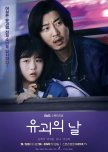
Flawed but emotionally engaging drama
The Kidnapping Day is one of those dramas where the main relationship was greater than the sum of its parts but not quite enough to overcome their shortcomings. And that math makes about as much sense as some of the plot holes in this drama about a loving father figure kidnapper and substitute daughter kidnappee.The strength of this drama was the relationship between Myung Joon and Ro Hee. The actors had great chemistry as the bumbling, good-hearted, desperate dad and genius 11-year-old who had never had the chance to form loving human attachments or simply play like the child she was. Once you left their nucleus, the characters and story began to break down with parts becoming repetitive and others lacking in logic. The plot trotted out the well-trod issues of police incompetence (with the exception of the lead detective) along with the requisite corruption issues although they waffled back and forth on the corruption. While I know women make up a small percentage of police officers in Korea it would have been nice to see one of the minor characters be a female officer in this overwhelmingly masculine drama. The bad guy pecking order and allegiances also shifted with similar incompetence issues. The overly dramatic villain left no furniture without his teeth marks as he chewed through the scenery. Class distinctions as they often do played a role in the story. And how far are people willing to go and who has to suffer for the good of all mankind or at least for those who have enough money? The role on which most of the drama ended up hinging was all over the place with motivations and reactions that often made little sense and the final confrontation missed the mark for me.
Despite its narrative flaws, I enjoyed this drama. Yoon Kye Sang gave a captivating performance as the father who would do anything to save his hospitalized biological daughter and the stranger in his care. His fists made up for what he lacked in strategical thinking, leaving the scheming up to the brilliant girl in his charge. Yuna demonstrated why Korea has the best child actors from any country. She portrayed not only the coldly, methodical experiment her character had been trained to be, but also the vulnerable child that needed an adult to protect her. Moments of the two playing, perhaps for the first time in her life, squealing in delight and getting her designer clothes dirty were heartwarming.
The Kidnapping Day may have had plot holes big enough to swallow The White Truck of Doom, but Myung’s devotion to the two little girls who depended on him covered those pitfalls enough to provide for an emotionally compelling drama. Roo Hee’s intellectual dominance might even leave you questioning who had really been kidnapped in this relationship.
10/31/23
Vond je deze recentie nuttig?
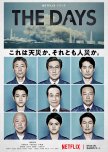
"What is the meaning of those days?"
The Days focused on the immediate aftermath of the March 11, 2011 earthquake and tsunami and their catastrophic effects on the Fukushima Daiichi Nuclear Power Station. The events were shown from the side of the workers and their heroic efforts and the political side which was hindered by personal stakes, ineptness, and evasion of responsibility. The performances were engaging and nuanced and by far the strength of this drama based on the tragic real-world calamity."Mistake or destiny?"
When the earthquake and tsunami devastated the electrical grid, the power plant was left without electricity relying on back-up generators to keep the safety measures going. Never dreaming that a tsunami would reach the heights it did, the generators were ruined by seawater. Men in the control room were in the dark both literally and in relation to what was going on in the deadly monsters they were in charge of. Maejima was assisted by veterans Furuya and Osugi as well as younger operators who sought to do what they could only aided by flashlights.
"Forlorn hope"
Manager Yoshida Masao set up headquarters in the Seismic Safe Room to assess the damage and brainstorm responses to the critical issues. Hampered by a loss of almost all communication after the tsunami and largely cut off from the rest of the world the plant operators had to use what they had to try and determine the status of the four units. They resorted to using car batteries to attempt to open vital valves. Things went from bad to worse with aftershocks and hydrogen explosions. Yoshida sought to protect his workers as best he could even while knowing they risked their lives as they attempted to gain information by traveling into the belly of the radioactive beasts and for the workers who fought to remove radioactive debris to bring the fire trucks and the hoses needed to supply water to cool and de-pressure the escalating situations. Eventually, he made the hard decision of who would stay as he ordered the evacuation of most of the workers, knowing that those who remained might die if the worst happened.
"Our company has lost its mind."
On the political side of things, Prime Minister Yan was not advised by nuclear power experts but often those who seemed to be political appointees-who needs an economist during a nuclear disaster? The management at TEPCO was completely unprepared for such a disaster and the manuals gave no guidelines. Both the political and business advisors seemed to be more concerned about giving unpleasant news or being held accountable. They also worried about looking bad to the public and never mentioned the nuclear meltdowns by name. Their ineffectual echo chamber could have led to even more devastation if Yoshida had listened to them. Yan at one point belittled the heroes' efforts. While the people safe from harm worried about plausible deniability, they failed to supply the plucky workers with the basic supplies they needed.
"We don't have a guide, we're in it to the end."
Yakusho Koji gave a powerful performance as Yoshida. Without histrionics he conveyed the calmness and strength of the man in charge of saving the nation with his decisions. Yakusho expressed grief, horror, resoluteness, and exasperation with his face and body movements and provided a stalwart character for the others to trust in and lean on. He showed Yoshida's defiance with deftness and even humor. It has been a long time since I have been so engaged by an actor's performance. Takenouchi Yutaka, Kobayashi Kaoru, and Musaka Naomasa played the operator warriors in the dark control room who braved the dangers so close to the deadly radiation. Though their faces were often covered by protective equipment and respirators the veteran actors' performance came through. These men portrayed, like Yoshida, knew their chances of surviving were slim to none and yet they did whatever was necessary for the greater good.
"I can no longer leave here alive."
The drama displayed the events and actions almost hour by gripping hour. I was always shocked by how much the operators had accomplished when the time clock was shown. Yoshida came across as the hero of this story and the faithful men who risked their lives to cool down and calm the radioactive beast that had the power to leave a third of Japan uninhabitable for decades. The actors who played the fearless Daiichi workers gave understated and formidable performances that were compelling and emotional. The Days was a cautionary tale of human hubris in the face of nature and yet how there are still heroes among us. It is a drama well worth the time for viewing.
9/7/23
Vond je deze recentie nuttig?

Deze recentie kan spoilers bevatten
The devil is in the details
As this is a 14 minute short film I won’t say much. You need to be prepared for very graphic talk about sex. It is not for the squeamish.The premise is a man meeting a school girl to have sex with her thinking she is a virgin. They begin to talk and he nauseatingly starts negotiating the price according to what he thinks her experience is. If you’ve gotten this far and are as repulsed as I was by him, don’t give up, keep going…
For a short film the production values were good as was the acting. The filmmakers packed a wallop of a story in those short minutes.
Again, not for the squeamish.
11/14/22
Vond je deze recentie nuttig?
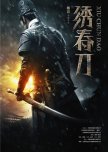
Deze recentie kan spoilers bevatten
It's not very often a martial arts movie comes out with strong fight scenes and even stronger acting. Brotherhood of the Blades boasted a quietly competent cast who elevated this movie above standard wuxia fare. Three Imperial Assassins and sworn brothers, though skilled with their swords had to face down death and deception from various factions. The always troublesome eunuch (this time after he was deposed) who shows up in numerous martial arts movies, once again instigated double-crossing schemes, this time imperiling the three loyal assassins.
Chang Chen led the three sworn brothers. His character, Shen Lian, though loyal to his brothers and emperor, was morally ambiguous. Willing to do whatever the situation called for, he set into motion a sword that would hang over all three of the assassins' heads.
The three hearty friends all harbored a need for money. Shen Lian wished to free a courtesan but lacked the power and money to do so. Wang Qian Yuan, as Lu Jian Xing, longed for promotion, only lacking the amount of money needed for bribing officials. Li Dong Xue as Jin Yi Chuan, the third assassin and the youngest, loved a doctor's daughter and had secrets of his own. The eunuch's waning power and wealth still proved perilous and tempting. The loyal allies had no safe quarter with the emperor and his officials. Blades aimed at them from nearly every quarter, even longtime allies proved treacherous.
The fight choreography was quite good, less reliant on wires and Olympic level gymnastics. The fights were fast, brutal, and bloody. They stretched reality in a few scenes, but so do most action movies. If I have one quibble, it's that the action scenes went on too long and were overused. As the story felt thin, perhaps it distracted from the lack of a more complex plot and character development.
The cinematography though dark and dreary fit the mood of the film. Often monochromatic, the shots worked perfectly for the bloody fight scenes. The costumes and sets were well done, befitting the time period. Brotherhood of Blades was stunning to watch without being overdone.
Chang Chen gave a mesmerizing performance, filling in gaps the script lacked. The supporting actors were all strong even though many of their characters were thinly drawn.
Brotherhood of the Blades battered away at the characters through intrigue and loss. Dark and intense, this film balanced its three main characters on the edge of a knife in the midst of hungry wolves. And set this viewer on the edge of her seat wondering who, if any, of the Brotherhood would survive.
Vond je deze recentie nuttig?

Also, I liked that the FL didn’t recoil from the ML’s kisses as if he was going to give her a root canal. They had a healthy tactile relationship. One of the few Kdramas I’ve seen where the couple was in a believable intimate relationship.
I found the acting solid all the way around.
Regarding the OST: I dinged it for the overuse of Stand By Your Man. They could have cut the use of that song by 80%. Bonus points though for Rachael Yamagata’s Something in the Rain. Already downloaded it.
I will rewatch all or at least parts of it when I’m having a bad day and need a smile and a warm feeling in my heart. I definitely recommend giving this drama a try.
Vond je deze recentie nuttig?

Deze recentie kan spoilers bevatten
Even if you start at a disadvantage, you can still be first across the finish line
Zero to Hero is an inspiring biopic about twelve-time Paralympic medalist So Wa Wai. So was the first para-athlete from Hong Kong to win gold and still holds the record in the 200m sprint. Zero to Hero is a feel good movie that also doesn't shy away from it's characters' faults and harsh reality.So Wa Wai was born with haemolytic jaundice which resulted in cerebral palsy. His mother was told he would never walk or be able to hold chopsticks. And he would only be able to hear 10-20%. She carried him on her back, literally, until he was four. In a desperate life or death moment, the mother challenged him to walk. As he gained more ability, they learned he may not walk well, but he could run.
As a teenager he joined the para-athlete's association and trained to run in competitions. The way to his success did not always run smoothly. His family was poor and used desperately needed funds to help him achieve his success. The movie highlighted how difficult it was for Paralympic athletes to continue training and competing with few subsidies from the government.
The true heart of this movie was the mother-son relationship. Sandra Ng gave a beautiful performance as the resolute mother who refused to give up on her child and sacrificed greatly to ensure he became all he could be and that he would have a financially secure future after she was gone. This created conflict with Wa Wai as he worried she was using him at one point and with his younger brother who felt at times that his only role was to be Wa Wai's future caretaker. Though perhaps flawed, the strength of this mother's love and determination to gain the best for her son and for him to overcome his limitations shined through. "Run to me at the finish line."
Leung Chung Hang's performance never felt patronizing. He poignantly portrayed a child dependent on his mother who grew into a man with his own goals and need to help his family. Yet in the end, it was the love for his dedicated mother that gave him the strength to attain those goals.
Heartwarming and inspirational with enough realistic edge to keep it from being treacly, Zero to Hero is a winner.
Vond je deze recentie nuttig?

"A heart that loves, never gets tired"
Homecoming was a part of the Jollibee’s Valentine 2018 series and a follow-up to its immensely popular short film/commercial Crush. Rather than a sequel, it filled out Crush’s story of young love that had a rocky start.Our nameless college student who delivered Jollibee hamburgers with encouraging notes to the female student he had a crush on in Crush, had to watch his love interest interacting with her boyfriend. As was hinted at in the first short, the boyfriend was very self-involved. The stalkerish good guy was always there to lend a hand or emotional support when she needed it. The beginning of the film showed they ended up together. The vignettes played out the progress of their relationship as she observed his generosity and tenacity.
I liked this short film/commercial better as it showed his actions that won her over and not just leaving her cold hamburgers with anonymous notes everywhere which I didn’t find particularly romantic. I won’t leave a drink unattended in a crowd, I’m certainly not going to eat a hamburger that appeared in my locker or on a bench. Here he stepped up to help her and was attentive to her needs. Jollibee was not forgotten after they became a couple. Even in old age she still loved Jollibee burgers and he was still Johnny on the spot to make sure she always had one on hand. The pragmatist in me wanted to mention she might need to have her cholesterol checked.
Homecoming was a cute follow-up to Crush that helped better explain how this couple based on a real story found their way to each other through a devotion to Jollibee burgers. Homecoming felt less contrived with a less problematic approach to romance than the first short film. As always, beauty and true love are in the eye of the beholder.
22 December 2024
Vond je deze recentie nuttig?
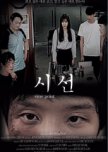
When a smiling distraught man approaches a woman, she assumes he has something nefarious in mind as does a male witness. As does the police officer who questions everyone except the wounded man. When Haneul, the wounded man, finally breaks down and gets their attention the story comes tumbling out.
In this world there are many biases that cloud our vision and interpretation of events. Every experience is sifted through cultural and social prejudices and norms often to the detriment of marginalized people. The Viewpoint showed the weakness of eye witness accounts and the harm caused by assumptions. A short and powerful reminder to open our minds to those we feel are “different” from us.
15 December 2024
Vond je deze recentie nuttig?

Like a rolling stone
Full disclosure, after watching this two-minute film I had to scurry across the internet and look up what sailing stones were. After doing my due diligence, I went back and rewatched Sailing Stones. I came to the conclusion that this was more a video piece of art than traditional film.Sailing Stones was filmed in black and white with zero dialogue. Several expressionless people are on the beach with long narrow tracks behind them. Their ages and sex vary. All stare ahead even as the sound of stone against stone grinds and moves them forward. At long last the sun begins to wake behind the mountain.
For anyone like me who is confused by the title, sailing stones (also sliding, walking, or rolling stones) have been found in Death Valley, California, USA. For a long time, stones were found to have moved with a dragging trail behind them. Turns out when the stones are on a melting sheet of ice, the strong winds can cause them to “sail.”
The disparate people in this short film were propelled in curving trails, victims of external forces instead of their own will and volition. Filmed for 10 CM’s single, “Sleepless in Seoul,” each of the individuals had their own reason for sleeplessness. A pregnant woman, a student, a salaryman, all were pushed about by the ever-present wind. Was the ground frozen beneath their feet or were their hearts and lives frozen as they were dispassionately transported?
I suspect like viewing a painting or a Rorschach test, everyone will have their own interpretation of this short film. I found the concept intriguing.
11 December 2024
Vond je deze recentie nuttig?
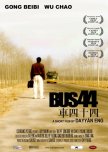
A bus ride you will not forget
Many of the short films I’ve watched have been heartwarming, life affirming, or poignant. Bus 44 blew those sentiments up in 11 minutes of dismal human nature with a series of shock and awe.Bus 44 travels through a rural area of idyllic lined trees and farm lands. The female bus driver stops for a young man who innocently flirts with her. At the next stop, two men enter the bus with evil on their minds. They rob the bus and make a decision that will prove fateful for everyone.
Director Dayyan Eng squeezed every minute out of this film imbuing the two leads with enough emotions to make them feel real. He managed to hit the Goldilocks Effect with the film not running too short nor too long. Without a whit of compassion, he also demonstrated the dire consequences of the Bystander Effect.
Bus 44 was short, horrifying, and satisfying in a grisly and perverse way. If you are looking for a feel good film, this is not it. Bus 44 showed the dark side of criminal behavior and group passivity. This well made film earned the film festival awards it won.
10 December 2024
***Spoilery trigger warning listed below***
Trigger warning: It’s listed as a spoiler in the tags, but for some people this needs to be more prominently displayed-Rape
Vond je deze recentie nuttig?
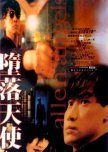
"The night is full of weirdos"
Fallen Angels was the film negative of Chungking Express. Both films dealt with lonely, disaffected people but Fallen Angels didn’t even pretend the characters had a shot at true love. Instead of police officers there were murderers and a slightly mad entrepreneur. Wong Kar Wai brought back the devastating canned pineapple and expiration dates, only this time the expiration dates were for relationships and lifespans.“I’m a lazy person, I like for people to arrange things for me.”
Wong Chi Ming is a hired killer. He calls himself lazy and enjoys having someone else tell him where to be and what to do. After finishing a job, he grabs a bus just like any other salary worker. When an old classmate on the bus asks about his life, he drags out pics and a story created for just such encounters. His partner, whom he never interacts with, cleans his apartment and gives him his assignments. She fancies herself in love with him and he, her. Wong runs into an old lover he doesn’t recognize, hooking up with her for a time. He Qi Wu lost his voice as a child after eating expired canned pineapples. His father is the caretaker of the Chungking Mansions Hotel where the secretive partner lives as well. At night Qi Wu breaks into businesses and runs them for himself. Too often he forces his services on customers who end up paying him to leave them alone. Qi Wu becomes involved with a woman whose boyfriend dumped her to marry another woman. Too soon he discovers that pineapples aren’t the only things with expiration dates.
“There are some things you can’t escape.”
Wong Kar Wai utilized his iconic green, yellow, and red palette once again. The characters and backgrounds flew frenetically about, always in motion as if they were trying to outrun their fates. The characters’ sun was the moon as they lived in a world constantly at night, lit by streetlamps and neon lights echoed on damp pavements. Obsession and desire replaced anything resembling true love as they grasped at any form of connection to break their loneliness and isolation no matter how temporary. Chungking had one blonde in a wig, the Hong Kong of Fallen Angels was overpopulated with women and men named Blondie. These blondes didn’t have more fun, they were always on the precipice of loss or brawls.
“We rub elbows with a lot of people every day. Some of them might become your friends or confidants.”
The acting was superb whether in action scenes, comedic situations, or characters sorrowfully scouring bars and streets for a glance at love. There was little to no plot, this was Wong Kar Wai. Style and mood ruled over narrative. The characters weren’t highly developed more like notes in a song too sad for words, played out in garish, muted tones. There are times with WKW that I’m not sure if his work is bold or self-indulgent like a video collage of dark emotions set on fire. I enjoyed Fallen Angels more than Chungking Express though I did miss Tony Leung’s presence. This film’s mood hit with me, swaying the balance to a bold, creative effort.
“The road wasn’t that long and I knew I’d be getting off soon. But at that moment I felt such warmth.”
9 December 2024
Trigger warnings: Self-pleasuring scenes and bathroom humor. For vegans, butcher scenes.
Vond je deze recentie nuttig?
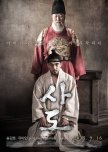
"In the royal household, they regard their children as enemies"
This was a hard film for me to write a review for. The Throne told the events leading up to the explosive event in 1762 when King Young Jo took his troublesome son’s punishment into his own hands. Or at least part of the events, giving reasons or making excuses for Crown Prince Sado’s reprehensible behavior depending on how you looked at it.Crown Prince Sado is called before his father after a possible aborted attempt to kill the king, something largely frowned upon. The king is in a jam because he can’t execute the prince for being a traitor because of the problematic law that states the whole family of a traitor would be judged, implicating the king and royal grandson as well. If the prince kills himself, his retainers and supporters are afraid they will be executed. Eventually, the king settles on locking the prince in a rice box with no food or water. The story then flips back and forth in time to explain how the two came to this moment of deadly impasse.
King Young Jo prided himself on his studies and discipline to Confucian ideals and decorum. Sado enjoyed art and hated studying. As the young prince grew up, the king became more disenchanted with the crown prince and more critical. When he made Sado a regent, Sado attempted to change taxation and create laws to benefit the people instead of the nobles. Rival factions were not amused and the king stepped in fearing a loss of power and prestige for himself. Regardless of what decisions Sado made, the king ridiculed him. And apparently because his daddy was mean to him, Sado snapped and became a murdering deviant.
In real life, Sado murdered a eunuch and carried the head around in his private quarters. He beat and raped the women in his circle and murdered many servants. Which came first, the chicken or the egg? The serial rapist/murderer behavior or a distant critical father? In the film the Queen Dowager, his wife, and other women seemed to care for him and dote on him so he wasn’t without attention and positive affirmation. It felt like the film was attempting to drum up sympathy for Sado, but I dare say all of the people he murdered and raped would not feel much compassion regardless of the reason for his brutal and inhuman behavior. Glossing over his vicious actions seemed to weigh the scales without all the facts.
The costumes, wigs, and sets were all beautiful and luxurious. The Throne excelled in the poignant performances by most of the actors including Song Kang Ho, Yoo Ah In, and Kim Hae Sook. Song showed how the king was strictly disciplined in his own life, having no leniency for Sado’s more lax behavior. He also portrayed the king as distraught by the actions he felt had to be done for the country and to spare his grandson. Yoo brought out the complexities of this screen prince who wasn’t in a hurry to be king and had his own ideas for the crown. The dissent into madness was believable. Kim played the pivotal role of the Dowager Queen who saw more good in her grandson than her son did.
If I hadn’t read about Sado’s unbearably cruel behavior, I would have rated this film higher. Somehow leaving out the details seemed disingenuous when assigning blame for his actions to the king’s critical conduct toward his son. If you can block all that out and enjoy the film for the quality acting and cinematography, it is a stunning film to watch.
4 December 2024
Vond je deze recentie nuttig?

 55
55 217
217 11
11






















